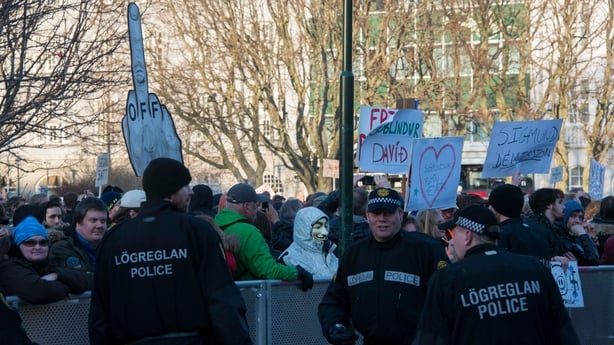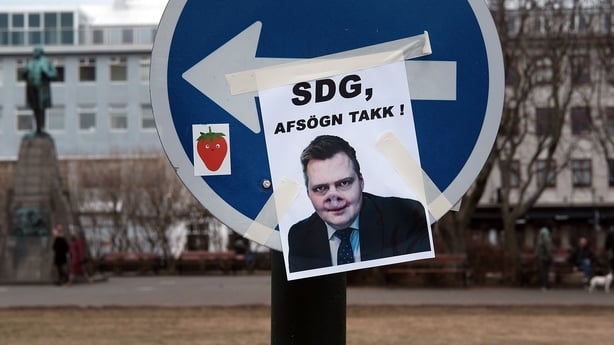Icelandic Prime Minister Sigmundur David Gunnlaugsson has resigned, the first major political casualty after the leak of the so-called Panama Papers financial documents.
"The prime minister told [his party's] parliamentary group meeting that he would step down as prime minister and I will take over," the Progressive party's deputy leader and agriculture minister, Sigurdur Ingi Johannsson, said in a live broadcast.
The junior member of the centre-right government coalition, the Independence Party, still has to approve the switch.
Mr Gunnlaugsson, 41, had been under pressure to resign after the leaked documents revealed that he and his wife Anna Sigurlaug Palsdottir owned an offshore company in the British Virgin Islands and had placed millions of dollars there.
Thousands of demonstrators had protested outside parliament in Reykjavik yesterday, throwing eggs and yoghurt at the building and calling on Mr Gunnlaugsson to step down.


The left-wing opposition had also presented a motion of no-confidence against Mr Gunnlaugsson.
President Olafur Ragnar Grimsson, who cut short a US visit to return to Reykjavik to deal with the crisis, refused to grant Mr Gunnlaugsson's request to dissolve parliament and call new elections ealier this afternoon.
Mr Gunnlaugsson's offshore company, named Wintris Inc and acquired in 2007, was intended to manage his wife's inheritance from her wealthy businessman father, according to the Panama Papers.
The prime minister sold his 50% share to his wife for a symbolic sum of $1 at the end of 2009.
But when he was elected to parliament for the first time in April 2009, he neglected to mention his stake in his declaration of shareholdings.
He said yesterday he regretted not having done so, but insisted he and his wife had followed Icelandic law and paid all their taxes in Iceland.
Meanwhile France will put Panama back on its list of countries that do not cooperate in efforts to track down tax dodgers, Finance Minister Michel Sapin has said in the wake of the Panama Papers revelations.
"France has decided to put Panama back on the list of uncooperative countries, with all the consequences that will have for those who have transactions" with the central American state, Mr Sapin told parliament.
Panama figured on a list of 30 tax havens last June when the European Commission unveiled its plan to combat tax evasion by multi-nationals.
Panama files reveal links to North Korean firms
Documents from the Panamanian legal firm at the centre of the data leak show that it had clients from North Korea who were blacklisted by US Treasury sanctions.
Clients of the company Mossack Fonseca included companies linked to North Korea's nuclear weapons programme.
The leaked documents show that Mossack Fonseca set up a company in 2006 called DCB Finance based in North Korea's capital Pyongyang but did not take notice of this for four years until late 2010 when it stopped doing business with the firm.
It was later sanctioned by the US Treasury for raising funds for the North Korean regime and being linked to a bank helping to fund the regime's nuclear weapons programme.
Mossack Fonseca said it never knowingly allowed the use of its companies by individuals having any relationship with North Korea.
One minute explainer: 'The Panama Papers' via @rtenews https://t.co/dupTAoIYie #PanamaPapers
— RTÉ (@rte) April 5, 2016
The US Treasury said DCB Finance had been used to "carry out international financial transactions as a means to avoid scrutiny by financial institutions avoiding business with North Korea."
A leaked email from Mossack Fonseca's compliance department in August 2013 appeared to acknowledge a lack of due diligence on the part of the law firm.
"We have not yet addressed the reason we maintained a relationship with DCB Finance when we knew or ought to have known from incorporation in 2006, that the country, North Korea was on the black list," the e-mail said.
"We should have identified from the onset that this was a high risk company," it added.
Meanwhile Paris-based Organisation for Economic Co-operation and Development - the OECD - has said Panama has failed to clean up its tax system.
Panamanian President Juan Carlos Varela, however, has insisted his government has zero tolerance for illicit activities.

